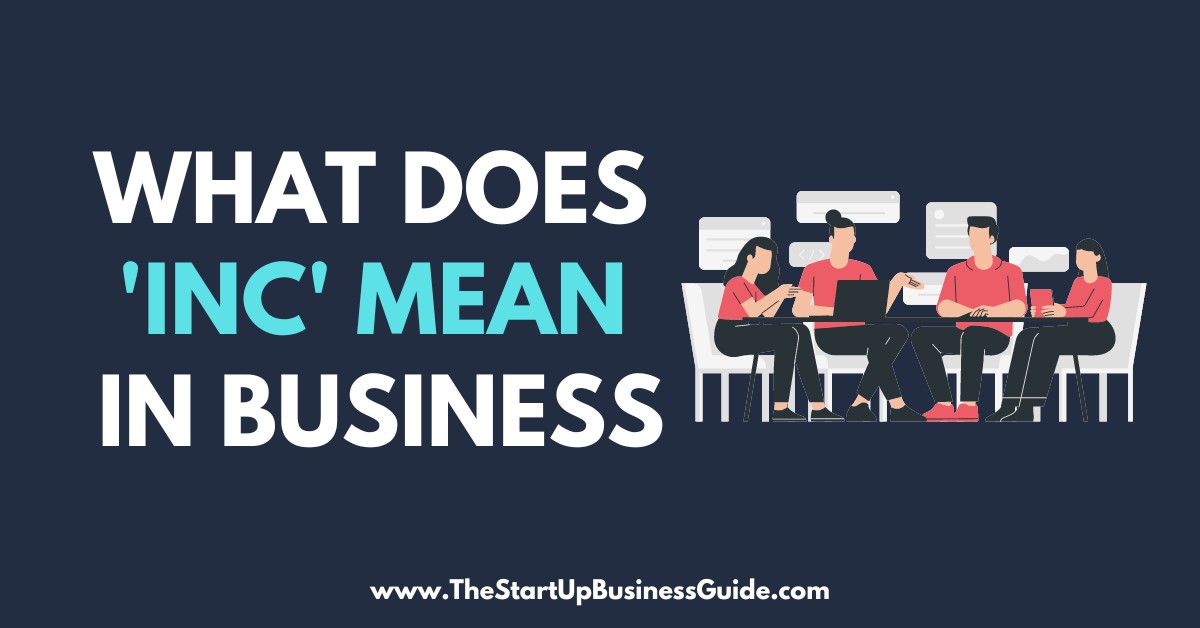What Does INC mean in Business?

If you’re a business owner, you may have heard the term “incorporation” thrown around, but you may not be entirely sure what it means or how it can benefit your business.
Or perhaps you’re considering starting a business and want to know what your options are. Well, you’re in the right place.
In this article, we’ll dive into what incorporating a business means, what the acronym “INC” stands for, and why it might be a good choice for your business.
Incorporation refers to the process of creating a separate legal entity for your business, which can help provide protection for your personal assets in case something goes wrong with your business.
An “INC” is short for “incorporated,” and it signifies that your business is a separate entity from you as an individual.
Essentially, when you incorporate your business, you’re creating a separate “person” that can enter into contracts, sue or be sued, and own assets, all separate from your personal self.
While there are a variety of different types of business structures to choose from, incorporating your business can offer certain benefits such as protection of your personal assets, access to funding, and potential tax benefits.
Of course, it’s important to weigh the pros and cons of incorporation before making a decision, and our article will help you to understand the process and make an informed choice.
So, whether you’re just starting out or you’ve been in business for a while, read on to learn more about the benefits and considerations of incorporation.
Let’s get started!
What Does INC Mean in Business?
As we mentioned earlier, “INC” stands for “incorporated.”
So, when you see a business with “INC” at the end of its name, it means that the business has gone through the process of incorporation.
But what exactly does that mean?
Incorporation refers to the process of creating a separate legal entity for your business.
This means that your business becomes a separate “person” in the eyes of the law.
It can enter into contracts, sue or be sued, and own assets, all separate from you as an individual.
This separation can provide protection for your personal assets in case something goes wrong with your business.
For example, if your business is sued, the plaintiffs can only go after the assets of the business and not your personal assets.
The process of incorporating a business varies depending on the state you’re in, but generally, it involves filing articles of incorporation with the appropriate state agency, such as the Secretary of State.
The articles of incorporation typically include information such as the business’s name, the names and addresses of its incorporators (the individuals who are forming the corporation), and the number of shares of stock the corporation is authorized to issue.
In addition, you will also have to have a board of directors, issue shares, and have the first meeting of the board of directors.
The legal requirements can vary, depending on the state and type of incorporation you chose, so it’s important to consult with a lawyer or an accountant to make sure you’re following the proper procedures.
Incorporating your business can provide a lot of benefits, but it’s also important to remember that it can also create additional responsibilities, such as maintaining corporate records, filing annual reports, and holding regular meetings.
It is also important to know that the incorporation process can be costly and time consuming, but it’s definitely worth considering if your business is growing and you want the added protection for your personal assets.
How to Incorporate Your Business (Form an INC)
So, you’ve decided that incorporating your business is the right choice for you.
Great! But where do you start? Incorporating a business can be a bit daunting, but it doesn’t have to be.
With a bit of planning and some help from professionals like lawyers or accountants, you can make the process go smoothly.
Here’s a step-by-step guide on how to incorporate your business:
- Choose a business name and check for availability: First and foremost, you’ll need to choose a unique name for your business. The name should be distinguishable from any existing business in your state. Most states require you to do a name search before filing your articles of incorporation, to ensure that the name you want is not already being used by another company.
- File articles of incorporation with the appropriate state agency: Once you have chosen your business name, you will file articles of incorporation with the appropriate state agency. These articles of incorporation typically include information such as the business’s name, the names and addresses of its incorporators (the individuals who are forming the corporation), and the number of shares of stock the corporation is authorized to issue.
- Obtain any necessary licenses and permits: Depending on the nature of your business and the state you are in, you may be required to obtain licenses and permits before you can begin operations. Be sure to check with your state government to find out what is required for your specific business.
- Appoint directors and shareholders (if applicable): Many states require corporations to have a board of directors, and some also require shareholders. You will need to appoint these individuals, and make sure that they meet any qualifications required by state law.
- Hold the first meeting of the board of directors: This will be the first formal meeting of your corporation’s board of directors, at this meeting you will adopt bylaws, elect officers and conduct any other business that is necessary for the formation of the corporation.
It’s important to note that each state has its own specific laws and regulations for incorporating a business, so it’s a good idea to consult with a lawyer or accountant to ensure that you are following the correct procedures for your state.
But with a bit of effort and the help of professionals, you’ll have your new incorporated business up and running in no time!
Incorporation Pros and Cons
As we’ve discussed earlier, incorporating your business can offer a lot of benefits, such as personal liability protection, access to funding, and potential tax benefits.
However, it’s important to be aware that there are also some downsides to incorporating.
In this section, we’ll take a look at some of the pros and cons of incorporating your business.
Pros:
- Personal liability protection: Incorporating your business creates a separation between you as an individual and your business, so if something goes wrong with your business, your personal assets will be protected.
- Access to funding: Incorporated businesses can raise capital by issuing shares of stock, which can make it easier for them to secure funding from investors or financial institutions.
- Tax benefits: Incorporating your business can provide some tax benefits. For example, corporations may be eligible for more favorable tax treatment than sole proprietorships or partnerships.
Cons:
- Increased legal and financial complexity: Incorporating your business can make the legal and financial aspects of running a business more complex, which can be daunting for some business owners. It also require more compliance and report filing.
- Higher compliance costs: Incorporated businesses are subject to more regulations and requirements than unincorporated businesses, which can be costly to comply with.
- Professional fees: Incorporation process is not always cheap and hiring professionals such as lawyers and accountants to help you with the process can add up.
It’s important to keep in mind that the decision to incorporate should be based on your specific business and circumstances.
It may not be the right choice for every business, but for some it can provide the protection and access to funding that they need to grow and thrive.
Therefore, it is important to weigh the pros and cons of incorporating your business before making a decision.
Be sure to consult with a lawyer or accountant to find out how incorporation would affect your business and what the costs would be.
INC vs Corp.
“INC” and “corp” are often used interchangeably, but they do have slightly different meanings.
The acronym “INC” stands for “incorporated,” which signifies that a business has gone through the process of incorporation to become a separate legal entity.
“Corp,” on the other hand, is short for “corporation,” which is a specific type of business entity.
A corporation is a type of legal entity that is separate and distinct from its owners, just like an “INC”.
A corporation is a legal construct that allows a business to function as a separate entity from its owners.
In other words, it can be thought of as an “artificial person” that has many of the same rights and responsibilities as a natural person.
It can enter into contracts, sue and be sued, and own assets.
When it comes to incorporating a business, both “INC” and “corp” businesses will go through similar process of filing articles of incorporation, appoint board of directors, issue shares (if applicable) and hold the first meeting of the board of directors.
The main difference between an “INC” and a “corp” is the type of business entity that is being formed.
It’s worth mentioning that the term “corp” is also commonly used to refer to a corporation in a more informal context, while “INC” is more often seen as a formal designation.
However, both terms can be used correctly in referring to corporations.
In summary, while both terms “INC” and “corp” are related to the process of incorporating a business and creating a separate legal entity, “INC” refers to the process of incorporation, while “corp” refers to the specific type of legal entity that results from that process.
The legal requirements for incorporating an “INC” and a “corp” are very similar and varies by state, so it’s always good to consult with a lawyer or accountant to know the best option for your business.
Difference between INC and LLC
When it comes to structuring your business, you have a few options to choose from.
One of the options you may come across is the Limited Liability Company, or LLC.
LLCs are a popular business structure choice among small business owners because of the personal liability protection they offer.
So, how does an LLC differ from an “INC”?
One of the main differences between the two business structures is in terms of ownership and management.
An LLC is a type of hybrid business structure that combines the characteristics of both a corporation and a partnership or sole proprietorship.
It has the personal liability protection of a corporation, but it is taxed like a partnership or sole proprietorship.
An “INC” on the other hand, is a separate legal entity with ownership represented by shares of stock.
It is owned by shareholders and managed by a board of directors.
Shareholders elect the board of directors and the board makes major business decisions.
Another difference is in terms of taxation. LLCs are considered pass-through entities, which means that the profits and losses of the LLC are “passed through” to the individual owners (known as members) and reported on their personal tax returns.
This means that an LLC is not subject to double taxation (taxation at the corporate and individual level).
Corporations, however, are subject to double taxation because corporate income is taxed, and then any dividends paid to shareholders are taxed again at the individual level.
It’s worth noting that some states have different rules for LLCs, and some allow different type of management structures such as manager-managed, and others don’t.
Therefore it’s important to consult with a lawyer or accountant before making a decision on the best structure for your business.
In conclusion, while both LLCs and “INCs” offer personal liability protection, they differ in terms of ownership, management, and taxation. LLCs have a more flexible management structure, and have pass-through taxation, while “INCs” have a formal management structure with shareholders and are subject to double taxation.
Each structure has its own unique set of advantages and disadvantages, so it’s important to consult with a professional to determine which is the best fit for your business.
Conclusion
In conclusion, incorporating your business can offer a lot of benefits, such as personal liability protection, access to funding, and potential tax benefits.
However, it’s important to be aware that there are also some downsides to incorporating.
Incorporation can make the legal and financial aspects of running a business more complex, and also lead to higher compliance costs.
There are different types of business structures such as LLCs and “INCs” that are available and each has its own unique set of advantages and disadvantages, so it’s important to consult with a professional to determine which is the best fit for your business.
When thinking of incorporating your business, it’s important to weigh the pros and cons, and to understand the specific process of incorporating.
Whether you choose to form an LLC or an “INC”, it is important to know that the process of incorporating is not always easy, but it can be worth it in the long run, as it offers protection for your personal assets, tax benefits, and access to funding.






